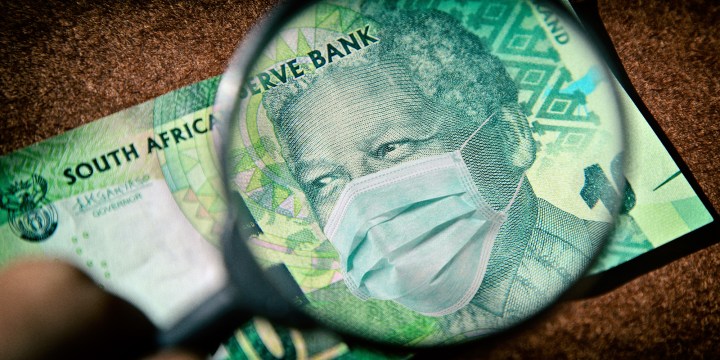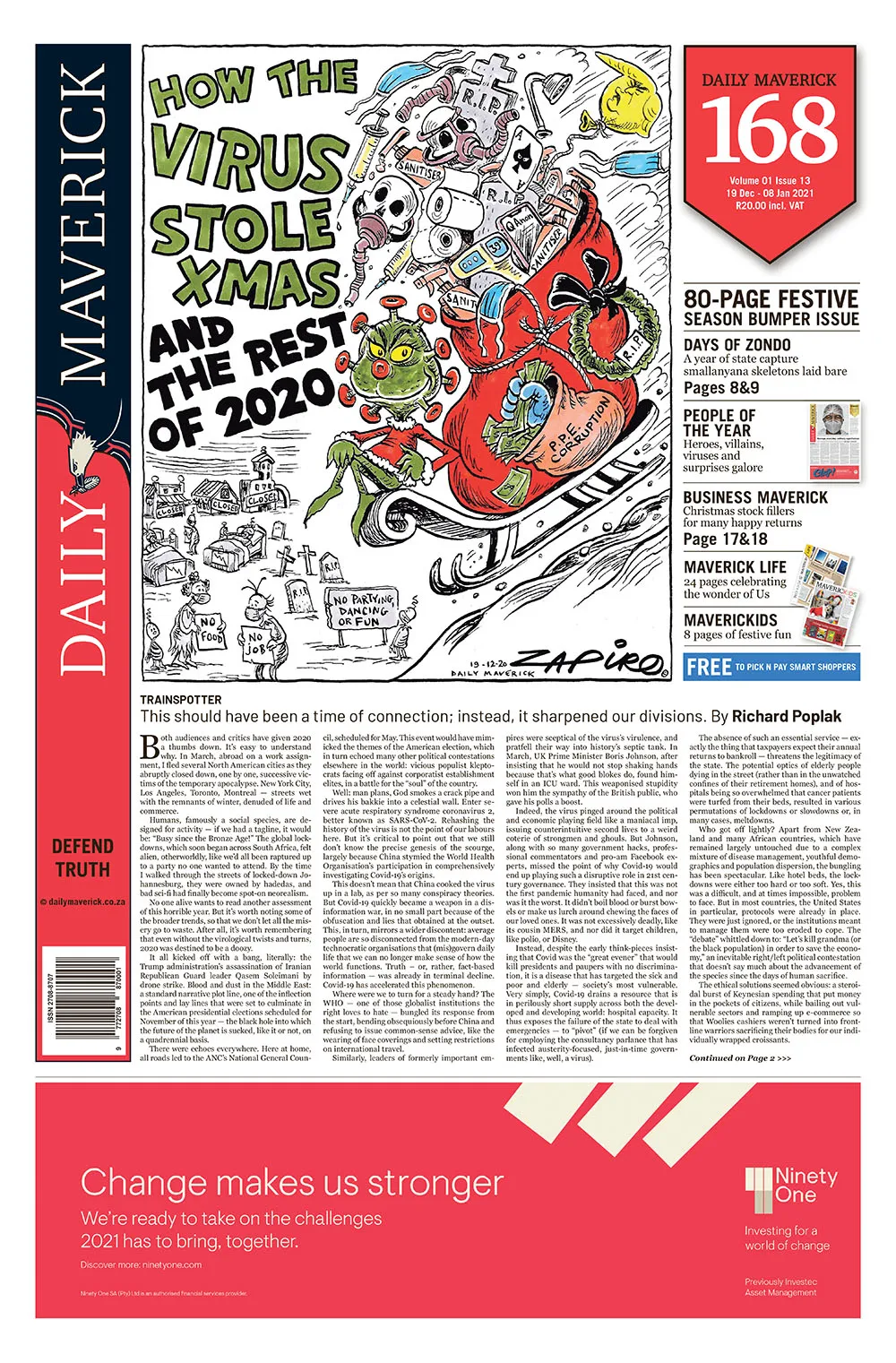Business Maverick 168
Looking at your money with 2020 hindsight

It’s safe to say no one is sorry to see the back of 2020. While we sombrely welcome 2021 in the comfort of our own homes (curfew is 10pm for restaurants and you need to be home by 11pm), this is a good time to reflect on how 2020 changed the way we view and handle our finances.
First published by Daily Maverick 168 weekly newspaper
- Retrenchment
According to StatsSA’s Quarterly Labour Force Survey, more than two million South Africans lost their jobs in the second quarter of 2020 – during the height of Covid-19 lockdowns. When companies are faced with budget cuts, they often opt to cut independent contractors and freelancers before looking to retrench permanent staff. As a freelancer, I was effectively “retrenched” twice in the space of a year.
What did we learn?
While it may yet be early days and many are still trying to patch their finances together, we may see an uptick in the number of retrenchment insurance policies being taken up in years to come. Old Mutual reported paying out R10-million in retrenchment cover in 2019 and one can only surmise that this figure would have increased in 2020.
- Life insurance
George Kolbe, head of marketing for Momentum Retail Life Insurance says Momentum anticipates an increase in death claims post-Covid-19. By August this year, Discovery Life had already paid out 51 lump sum life insurance claims for Covid-19 related deaths and illnesses, including one for R12.5-million.
The true value of life insurance was brought home to both those with policies in place and those without cover. According to the Association for Savings and Investment South Africa (ASISA), life insurers provided more than 458 000 policyholders with premium relief assistance to the value of more than R1-billion between March and July this year. This relief helped policyholders whose earnings were impacted by the Covid-19 lockdown so that they could preserve their risk cover and savings policies.
What did we learn?
Life insurance is not designed to enrich those you leave behind, but in 2020, it proved to be a vital financial lifeline for families who lost their breadwinners and families who lost more than one income earner. While many may have previously thought of life insurance as a financial product that is “nice to have”, one hopes the harsh reality of Covid-19 brought home the message that life insurance cover really can help meet your family’s financial needs after you die.
- Medical costs
As we get ready to ride the second wave of Covid-19 infections, the laughter that accompanied the mass purchasing of toilet rolls at the start of the lockdown has died down. It has been replaced by pharmacists turning away patients with valid prescriptions for Calciferol, a Vitamin D supplement that is in short supply nationwide. Vitamin D has been widely said to help with Covid-19 treatment and supplies have apparently been exhausted as people stockpile this supplement. Those who have had Covid-19 (I had it in July) will know that the plethora of medication taken at home while self-isolating is no joke. The costs are not low and those who had to be hospitalised, have been grateful for their medical scheme cover.
What did we learn?
Medical scheme cover is unlikely to be taken for granted going forward. While the number of medical scheme beneficiaries may not change significantly, the number of people who took the time to read through their benefits at the end of this year is most likely higher than in previous years. The country’s largest medical scheme administrator, Discovery Health and one of the bigger hospital networks, Netcare, both recognised the incredible need for reasonable medical care offerings. These healthcare companies have come to the table with a low-cost, prepaid medical voucher option that allows South Africans to buy affordable primary healthcare for themselves, their loved ones and even their staff.
- Emergency fund
“You need to save for a rainy day” – financial experts have been singing this song for decades. However, where an “emergency” once meant your geyser bursting or your car needing repairs, the term took on a whole new meaning in 2020. Those who were fortunate enough to have an emergency fund available were able to use these funds to weather the lockdown. The take-up of Covid-19 relief funds from the major banks and the government relief fund bore witness to the fact that millions had no access to any emergency fund or savings of their own.
What did we learn?
Saving is not something to put off for the future but something that should be implemented as soon as possible. You might not have very much to save to begin with, but small choices can get you started. Sacrifice that cup of coffee when you get to work, carry a packed lunch to the office, shop around for grocery specials. Those small savings all add up and every cent you can set aside is another cent in your savings stockpile.
- Funeral cover
As at 14 December, the official (as per the Department of Health) number of confirmed Covid-19 fatalities had passed the 23 000 mark. Pieter van der Westhuizen, funeral director at Avbob told Daily Maverick that the number of funerals and claims seemed to be more in line with the South African Medical Research Council’s figures, which reported 48 545 excess deaths between 6 May and 27 October this year. Global life insurance provider, SunLife’s research revealed that South Africa is the fourth most expensive place to die in the world. The research was based on the cost of a funeral relative to the cost of living and earnings. The average South African funeral cost R26 875 which translated to 13% of the average salary (R270 000 a year according to StatsSA).
What did we learn?
With social distancing and strict number restrictions in place, South Africans will hopefully have realised the wasteful expenditure that goes into lavish funerals. This is money that could be better spent to help ease the financial burden of grieving families. The spotlight on funeral insurance policies should also have improved consumer education about what to look for when buying a funeral policy.
2020 has been a massive learning curve for not just South Africans but the world at large. We learnt how to make do with less, we learnt how to prioritise our purchases, we learnt how to live without frivolous expenses and hopefully … hopefully, we learnt how to manage our money just a little better than before. DM168
This story first appeared in our weekly Daily Maverick 168 newspaper which is available for free to Pick ‘n Pay Smartshoppers at these Pick ‘n Pay stores.




















Comments - Please login in order to comment.